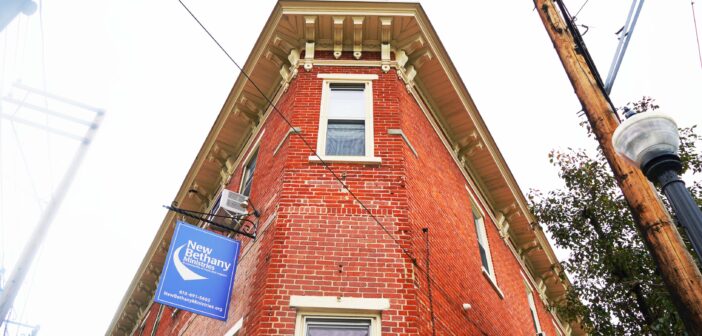Marc Rittle is the executive director of New Bethany, a South Side organization offering support to people experiencing hunger, poverty and homelessness.

Marc Rittle is the Executive Director at New Bethany. This mont, Rittle shares the organization’s solutions to homelessness and the housing crisis. (Photo Courtesy of Marc Rittle)
It’s official: poverty is back. As hard as it might be to believe, the national poverty rate dipped to an all-time low during the COVID-19 pandemic. Social support during the crisis was better than ever. Evictions were suspended, cash assistance was as generous as ever, and cities were taking care of the unsheltered and unhoused in creative ways. Getting to witness unprecedented care for our neighbors from 2020 through 2022 was the silver lining on what otherwise was a really difficult time.
Right here in the South Side of Bethlehem in the summer of 2020, New Bethany placed 26 unhoused people into the Comfort Suites on Third Street and found a permanent place for nearly everyone within four months. The City of Bethlehem’s Department of Health paid for the stays, and Northampton County alongside the city funded social work staff at New Bethany to ensure stability.
But that money is now gone. Evictions are on the rise. No funds remain for temporary housing or linked social support. The New York Times reports a nationwide rise in poverty, returning to pre-pandemic levels in a single year.
Caption: A chart printed in The New York Times on Sept. 12, 2023, comparing different age groups living in poverty in the U.S in recent years.
https://www.nytimes.com/2023/09/12/business/economy/income-poverty-health-insurance.html
So what do we do? Federal funds or not, we need to look at the successful strategies we implemented during the peak of the crisis. It took a community to get us there, and we as neighbors can pull together once again. Here are some highly achievable ideas:
Eviction Mediation
Right now, on Bethlehem’s South Side, pro-bono attorneys from North Penn Legal Services are part of a lawyer-for-a-day program, providing legal assistance to people who receive eviction notices. The process goes as follows: a tenant falls behind on rent but generally has the income to remain in the apartment. Then, a pro-bono attorney works with the tenant, landlord and magisterial judge to arrange an agreement to remain housed. The agreement usually means the tenant pays a flat fee in order to stay (“pay and stay”). Finally, a nonprofit — in this case New Bethany — pays the fee directly to the landlord and further counsels the tenant in order not to fall into crisis again.
This program has already saved dozens of families from becoming homeless, thereby curbing the South Side housing crisis just a little bit more. This wouldn’t be possible without adequate funds: the project is backed by a one-time grant from the PPL United Way Housing Heroes fund and is seeking additional dollars to keep it going.
Church-to-Housing Conversion
For whatever reason we attest, there is no denying the growing number of unoccupied churches. Right on the South Side of Bethlehem, there are a few, more than one of which is owned by Lehigh University. Converting churches to housing is not a stretch: This is happening nationally in cities like Seattle, Washington; San Diego, California; Arlington, Virginia; Indianapolis, Indiana; and Washington D.C. But locally, it is also happening in Allentown, Reading and Jersey City, New Jersey. A new coalition called Yes in Gods Backyard LV, part of a national effort to convert places of worship into housing, has sprung up and is seeking new partners.
Alley Homes
If only we could find a way to quickly build smaller homes on existing private property, thereby saving both money and time for everyone involved. Enter a growing local collaborative effort to build Accessible Dwelling Units, spearheaded by Lehigh University’s Wes Hiatt, art, architecture and design professor. Two years ago, Hiatt and his colleagues presented a model called “Alley Homes” for building Accessible Dwelling Units on large residential properties that might have some extra unused parcels to build a large, detached on-site affordable apartment. Several Bethlehem residences have already been identified that have the unique physical requirements and amount of space that could accomplish the building of Accessible Dwelling Units.
Additional Affordable Housing
If we can reinvigorate dormant churches, hotels, and unused residential space, the sky is the limit: literally! New high-rise units are regularly proposed across the Lehigh Valley. As we build up locally, it would only take a percentage of these structures to add additional low-income units to help solve the crisis. We talk a lot about institutional, public and nonprofit solutions, but the private market has considerable buying power and could do a lot to reduce the number of unhoused individuals and families valley-wide.
Housing First
The best way to solve the unhoused crisis is to place people in housing. This is called Housing First and is intended to get people off the streets and into permanent shelters — and do it in a rapid fashion. But we need to remember that every housing solution should be coupled with strong (continuously funded) social services. After all, unhoused people went through significant trauma or experienced a dramatic change in their lives to become homeless in the first place. It takes skilled social service workers to walk a person or family through the process of becoming stable once again. This social service component can easily be paired with any housing solution.
Beginning October 2023, New Bethany will begin to house a limited number of families using a first-time Federal grant from the Department of Housing and Urban Development. The grant pairs immediate housing with up to 24 months of financial assistance and social services. Once successful with the grant, we will expand the department’s offer to more households, but we won’t find this success without adequate available rental units. Our organization can only go so far and requires the assistance of community partners willing and able to make housing available to our clientele.
In conclusion
The City of Bethlehem and the Bethlehem Housing Authority are about to enter the planning stages of a massive conversion of public housing to mixed-income housing in North Side Bethlehem. This conversion will add over 200 new homes in the city limits. New Bethany is in the planning stages of our own conversion of our South Side facility (soon to be seeking significant financial support). The City of Bethlehem is headed toward the creation of a year-round homeless shelter to give indoor respite to the unhoused all 12 months of the year. None of this is possible without collaboration and partnership between universities, nonprofits, city government, the faith community, private development and others. Every single solution and idea must be a joint community plan, and there is still room for new partners to step in every one of these plans.
As New Bethany just hosted over 250 people at our annual Souper Day luncheon, we presented many of the above-listed solutions. Representatives from social, private, public and institutional sectors were all present, and we all agreed to make a pledge to do more for our neighbors in need. As keynote speaker Gwen Didden, director of the Berks and Northampton Housing Authority stated, “We are all smart individuals, but together we can be brilliant.” I couldn’t say it better. Let’s get to work.






Comment policy
Comments posted to The Brown and White website are reviewed by a moderator before being approved. Incendiary speech or harassing language, including comments targeted at individuals, may be deemed unacceptable and not published. Spam and other soliciting will also be declined.
The Brown and White also reserves the right to not publish entirely anonymous comments.
1 Comment
Excellent reporting. May the planning go well.